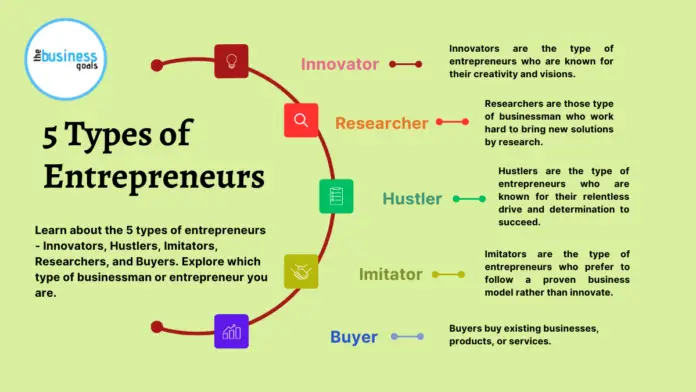Entrepreneurship is not about starting a business. But also about the types of entrepreneurs you are. Businessmen and entrepreneurs are actually the same with slightly different definitions as follows;
There are different types of entrepreneurs in entrepreneurship, In this post, we are talking about the five types of entrepreneurs.
Types of entrepreneurs are categorized into five main types.
- Innovators
- Hustlers
- Imitators
- Researchers
- Buyers
In this blog post, we will explore the five main types of entrepreneurs. I will provide insights into what sets them apart. By identifying which type of entrepreneur you are. You can learn how to achieve success in business.
So, let’s dive in and discover the type of businessman you are.
Innovators
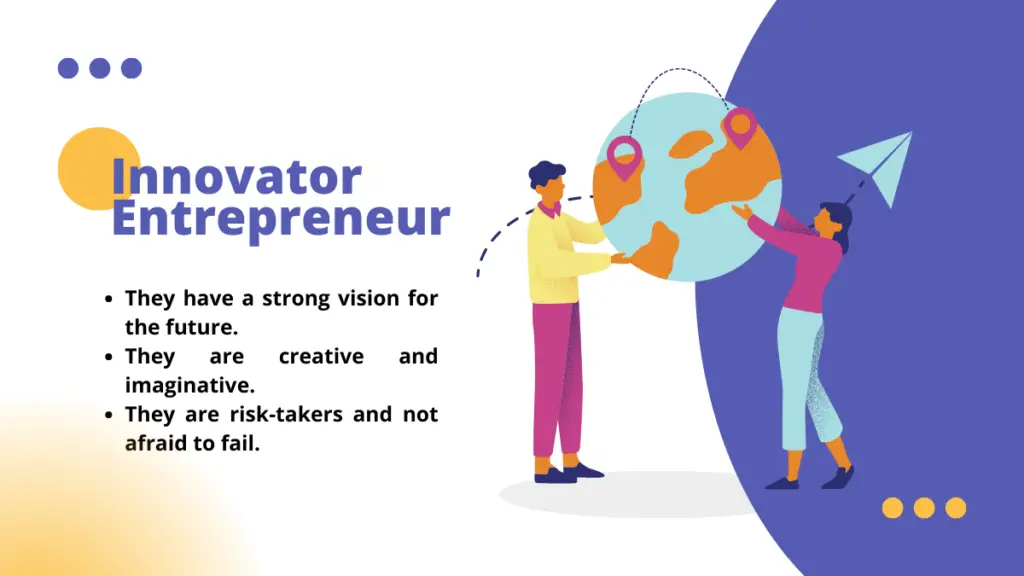
Innovators are the types of entrepreneurs who are known for their creativity and visions. They are always looking for ways to disrupt the status quo and come up with new and innovative ideas. They know fearless innovation leads to revolutionary products that push industry boundaries
Innovators are the pioneers of the business world. They are the ones who come up with new and creative ideas that change the world. Innovators are the ones who take risks and try new things, even if going against the norm. They are visionaries who see opportunities where others see obstacles.
If you identify as an Innovator, then you are likely someone who thrives on change. You are the one who is always seeking new and exciting opportunities. You are driven by a desire for progress, you seek out new technologies and trends to improve your business.
Characteristics of Innovators
Here are some characteristics that define an innovator. They are creative and imaginative, also risk-takers, and not afraid to fail. Innovators have a strong vision for the future. This type of entrepreneur is persistent and determined. They are always looking for new opportunities
One of the key strengths of Innovators is their ability to think outside the box. Innovators are not limited by conventional thinking or existing processes. They are able to come up with novel solutions to complex problems. Innovators are often the ones who create new markets or disrupt existing ones, paving the way for others to follow.
Challenges Faced by Innovators
But, being an Innovator also comes with its challenges. Innovation requires a high level of risk-taking, and not all ideas will be successful. Innovators must be ready for failures and should have the resilience to bounce back. Because Innovators are always seeking the next big thing, they may struggle with staying focused on one idea.
The risk of failure can be high, and innovators may face financial losses. Innovators may face resistance from the market and the competition. They may struggle to convince investors to fund their new ideas.
How to Succeed as an Innovator
To be a successful Innovator, it is important to surround yourself with a team that shares your vision. You may also enjoy networking with other Innovators in your industry. By attending conferences or events that focus on emerging trends. Stay up-to-date with the latest technologies and advancements in your field.
- Keep a positive mindset and believe in your vision.
- Be persistent and don’t give up.
- Surround yourself with supportive people who share your vision.
- Be open to feedback and constructive criticism, but also trust your instincts.
- Continue to learn and stay up-to-date with industry trends and advancements.
Innovators are a vital component of any industry, bringing new ideas and perspectives. That drives progress and innovation. If you are an Innovator, embrace your strengths and take calculated risks for your vision.
Examples of Successful Innovators
Steve Jobs
He revolutionized the technology industry with the creation of Apple products like the iPhone.
Elon Musk
He founded Tesla and SpaceX and is pushing the boundaries of technology and space exploration.
Mark Zuckerberg
He created Facebook and transformed the way people connect and share information online.
Advantages and Disadvantages of being an Innovator
Advantages
- Innovators are good at making new things that can change industries and make lots of money.
- Less Competition in Initial Days.
- Innovators always try to do things differently and break the usual rules. This can help them grow and succeed for a long time.
Disadvantages:
- Innovation requires a significant investment of time, money, and resources, which can be risky and may not always pay off.
- Innovators might face resistance from shareholders.
- Innovators might have trouble growing their businesses because of less finance.
The Hustler Entrepreneur
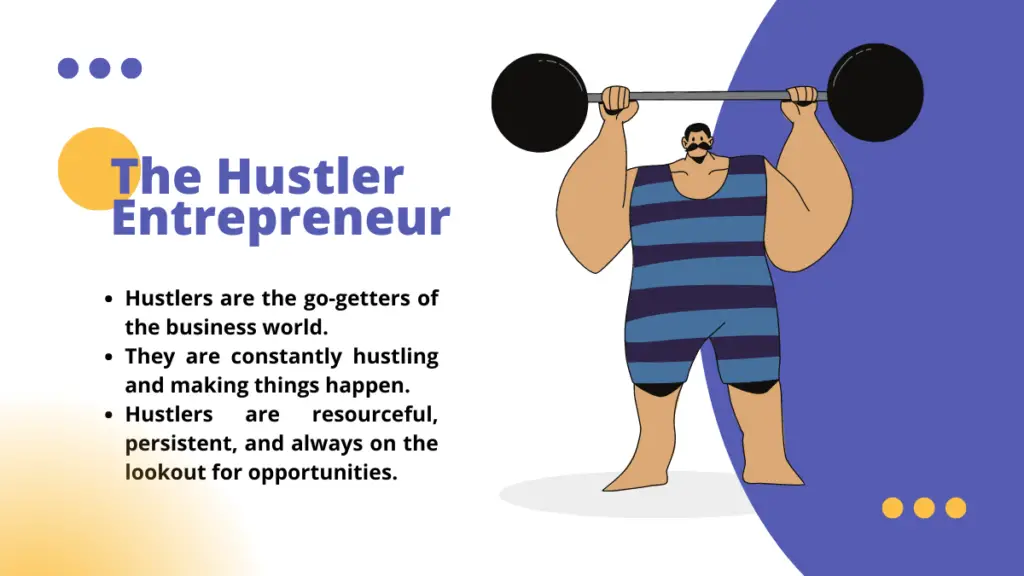

Hustlers are the types of entrepreneurs who are known for their relentless drive and determination to succeed. They are often self-made and have a strong work ethic that fuels their success. Hustlers are not afraid to put in long hours and make sacrifices in pursuit of their goals.
If you identify as a Hustler, then you are likely someone who is motivated and goal-oriented. You have a clear vision of what you want to achieve, and you are willing to do whatever it takes to get there. You may have a natural ability to sell yourself and your ideas and can adapt to changing situations.
Characteristics of Hustlers
Hustlers are the go-getters of the business world. They are constantly hustling and making things happen. Hustlers are resourceful, persistent, and always on the lookout for opportunities. They are persistent and determined types of entrepreneurs. Hustlers are creative and resourceful. They are excellent at networking and building relationships. Hustlers are not afraid to take risks.
One of the key strengths of Hustlers types of entrepreneurs is their ability to hustle. They are masters of networking and know how to leverage their connections to get ahead. They are often the ones who can turn a small idea into a successful business venture.
Challenges Faced by Hustlers
Although being a Hustler can lead to great success, it also has its challenges. The hustle can be exhausting and lead to burnout. Hustlers may struggle with work-life balance. They may face rejection and failure along the way. It can affect their relationships and well-being. Because they are so focused on achieving their goals, they may not always think about the consequences of their actions.
How to Succeed as a Hustler
To be a successful Hustler, it is important to have a clear vision of your goals and to stay focused on them. You may enjoy building a strong team around you that can support you in achieving your goals. Additionally, it is important to take care of your physical and mental well-being and to find ways to maintain a healthy work-life balance.
- Build strong relationships with others in your industry.
- Continue learning and improving your skills.
- Embrace failure and use it as a learning opportunity.
- Set goals and stay focused on your priorities.
- Stay organized and manage your time.
Examples of Successful Hustlers
Gary Vaynerchuk
He turned his family’s liquor store into a multi-million dollar business. He is now a successful entrepreneur, investor, and author.
Daymond John
He founded FUBU and is now a successful entrepreneur and investor on the hit show Shark Tank.
Grant Cardone
He went from being in debt to building a multi-million dollar real estate empire.
Advantages and Disadvantages of Being a Hustler
Advantages:
- Hustlers are highly driven and motivated individuals.
- They are often excellent salespeople and are skilled at building business relationships.
- Hustlers are adaptable and able to pivot their business strategies quickly in response to market trends and changes.
Disadvantages:
- Hustlers may sacrifice work-life balance and burn out quickly due to their intense focus on work and success.
- They may prioritize working hard over the financial value of the result.
- Hustlers may struggle with delegation and teamwork, which can limit the potential for growth and expansion.
Imitators
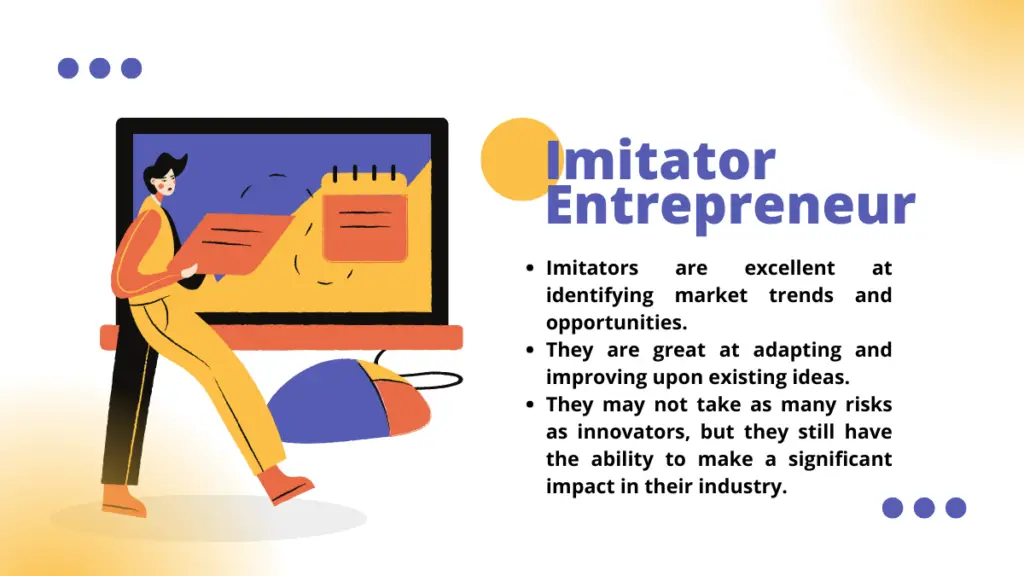

Imitators are the types of businessmen who prefer to follow a proven business model rather than innovate.
They are not interested in being the first in the market. Instead, focus on finding a successful business idea and replicating it in their own way.
If you identify as an Imitator, then you are likely someone who values stability and predictability. You may not be comfortable with taking big risks or investing in untested ideas. Instead, you prefer to find a successful business model and replicate it with some modifications to make it your own.
Characteristics of Imitators
Imitators are excellent at identifying market trends and opportunities. They are great types of businessmen at adapting and improving upon existing ideas. Imitators do not take as many risks as innovators, but they still have the ability to make a significant impact in their industry.
They are able to learn from the successes and failures of others. By following their business model, they can avoid some of the pitfalls and mistakes. They are not focused on being the first in the market. They may have a better understanding of what the market wants and needs.
Challenges Faced by Imitators
Being an Imitator also comes with its challenges. Imitators may face failure because relying on imitating others may not be sustainable in the long run. They may find it hard to stand out from their competitors and get new customers because they don’t focus on being innovative.
Imitators may face legal challenges if their imitations are too like existing products. Imitators may struggle to stand out in a crowded market. They may not receive as much recognition as innovators types of entrepreneurs for their ideas.
How to Succeed as an Imitator
To succeed as an Imitator, it’s important to balance using a proven business model with being open to making changes. You can enjoy researching the market and finding ways to be different from your competitors.
- Identify market trends and opportunities.
- Make improvements to existing products to make them more appealing to consumers.
- Focus on providing excellent customer service for building brand loyalty.
- Stay up-to-date with industry advancements and innovate within the confines of existing ideas.
Examples of Successful Imitators
Owner of McDonald’s,
He took the idea of fast food and made it a global phenomenon.
Owner of Samsung,
He took the smartphone and made it a viable alternative to Apple’s iPhone.
Jeff Bezos
He took the idea of online shopping and made it a convenient and reliable way to shop for millions of people.
Advantages and Disadvantages of Being Imitator Types of Entrepreneurs
Advantages:
- Imitators can make money by offering similar products in markets that already have a lot of customers. They can try to make their products cheaper or different in some way to attract customers.
- Imitators may be able to save money by using existing networks for their products.
- Imitators may have the advantage of learning from the mistakes and successes of established companies in the market.
Disadvantages:
- Imitators may get into trouble if their products or services copy patented or trademarked ideas of other companies.
- They may find it tough to stand out from other established companies which can stop them from growing.
- They can also have trouble convincing customers to trust and stay loyal to them because they are seen as lacking originality.
Researchers Types of Entrepreneurs
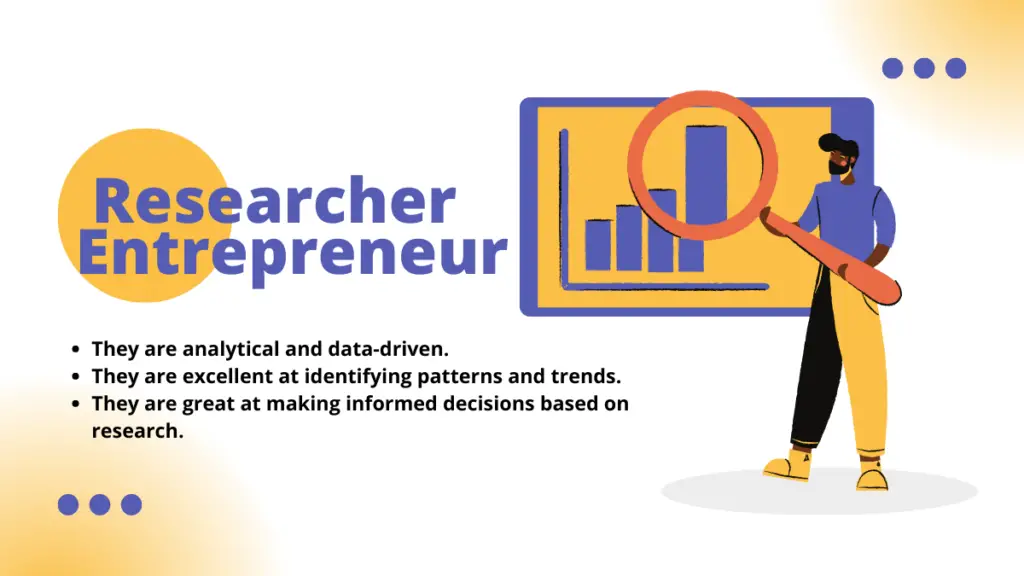

Researchers are those types of entrepreneurs who work hard to bring new solutions through research. They invest a lot of time in researching, experimenting, and developing new products. They invest time to improve existing ones or make something completely new. One of the strengths of Researchers is their ability to identify gaps in the market.
Then they develop innovative solutions to fill them. They are often able to expect future trends. They can stay ahead of the curve by researching and experimenting with new ideas. Because they find new ways, they may be able to attract a loyal customer base.
Characteristics of Researchers
They are analytical and data-driven. Researchers are excellent at identifying patterns and trends. They are great at making informed decisions based on research. Researchers may not take as many risks as innovators or hustlers. But they still have the ability to make a significant impact in their industry.
Challenges Faced by Researchers
The researcher also faces challenges. Developing new ideas and innovations can be time-consuming. It is also an expensive process, and there is no guarantee of success. Researchers are often focused on developing something new. They may struggle to find a market or convince potential customers to try their products.
Success Formula for Researcher
To be a successful Researcher, it is important to have a clear understanding of your market. You can get benefits by conducting thorough market research. Then develop a strong marketing strategy to build awareness. It is important to be open to feedback and to iterate and improve your ideas based on customer feedback. Stay up-to-date with the latest research methods and techniques. Focus on building strong analytical skills. Learn to communicate research findings with others in your organization or industry.
Examples of Successful Researchers
Successful scientists are not only good at researching but also good at starting their own companies. For example,
Theodor Hänsch
He won a Nobel Prize in Germany and started a company called MenloSystems. They used his “frequency comb” invention to create products for sale. In fact, according to a study by the Max Planck Institute for Economics in Jena. Every fourth researcher who patents an invention also starts a company.
Warren Buffett,
He uses his analytical skills to make strategic investments and build his massive wealth.
Advantages and Disadvantages of Researchers
Advantages
- Researchers are dedicated to developing and bringing new ideas and innovations to the market. This can help to drive progress and change in the industry.
- Researchers are often able to anticipate future trends and stay ahead of the curve by constantly researching.
- Researchers Focus on data and information.
Disadvantages
- Researching new ideas can be a time-consuming and expensive process.
- Researchers may struggle to find a market or convince potential customers to try their new products or services.
- There is no guarantee of success in the research and development process, which can lead to uncertainty and risk for Researchers.
Buyers
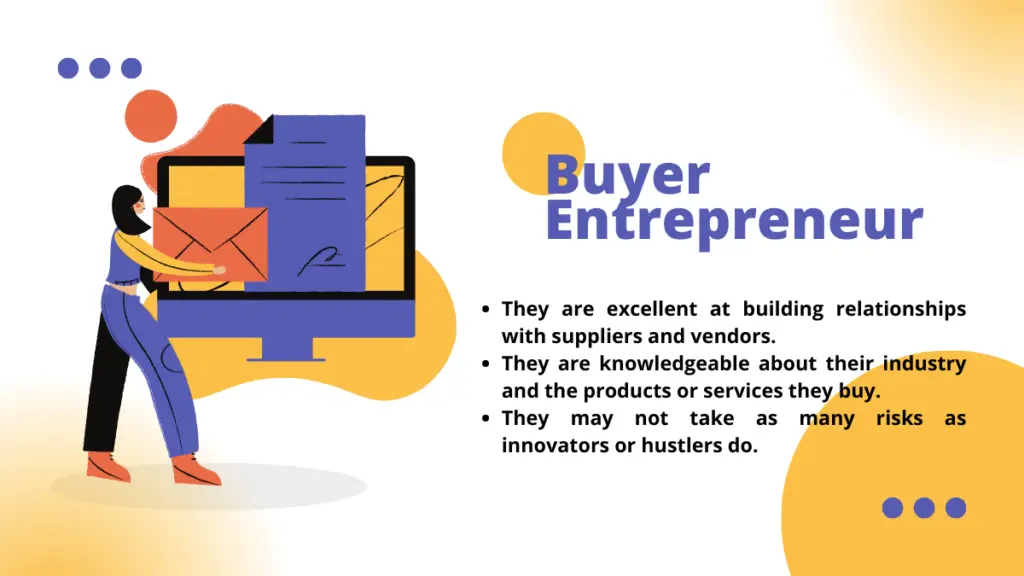

Buyers buy existing businesses, products, or services. They get it with the aim of growing their portfolio and generating profits. Buyers may have a strong background in finance and investment. They are also good negotiators.
If you identify as a Buyer, then you likely have a keen eye for identifying profitable opportunities in the market. You can identify ways to improve their profitability. Buyers may also be benefitting by building a diverse portfolio of assets for generating a passive income stream.
Characteristics of Buyers
Buyers are good at growing their businesses by buying already established businesses. They use their money and negotiation skills to get these assets for less and make more profit. Buyers are also good at evaluating the potential of existing businesses.
They are good negotiators and are great at finding deals. Buyers are excellent at building relationships with suppliers and vendors. They are knowledgeable about their industry and the products or services they buy.
Challenges Faced by Buyers
It’s hard to know if a business is worth buying, and there is a risk that it won’t make enough money. Buyers may have trouble being creative or standing out from their competition. Because they focus on buying what already exists. Buyers may struggle to adapt to changing market conditions and industry trends. They may face challenges with negotiating deals in competitive markets.
How to Succeed as Buyers
To be a successful Buyer, it is important to have a strong understanding of finance and investment.
- Build strong relationships with suppliers and vendors.
- Stay up-to-date with industry trends and advancements to make informed purchasing decisions.
- Be proactive in identifying potential issues and addressing them early.
- Continue improving the procurement processes to increase efficiency and reduce costs.
Examples of Successful Buyers
Sam Walton
He built Walmart into a global retail powerhouse by negotiating great deals with suppliers.
Tim Cook
He uses his buying skills to manage Apple’s complex supply chain and negotiate favorable deals with suppliers.
Jack Ma
He builds Alibaba into one of the world’s largest e-commerce companies by using his buying skills.
Maarten Leerdam
His Company Inter Snack Group buys every successful snack manufacturer worldwide.
Advantages and Disadvantages of Being a Buyer
Advantages
- Buyers are able to expand their portfolio by acquiring existing businesses with large customer bases.
- They do not care much about innovations and buy successful and proven businesses only.
- By acquiring existing businesses, they also enjoy existing markets.
Disadvantages
- There is always a risk that an investment may not generate the expected returns, which can lead to financial losses for Buyers.
- Buyers pay a high price for good businesses.
- It can be hard to tell how good an existing business or asset is, which can lead to poor investment decisions.
There isn’t a universally accepted distinction in the types of entrepreneurs, as the types differ from region to region based on the business sectors active in that country. However, Clarence Danhof classifies entrepreneurs into four types of Businessmen.
Conclusion
As we have discusses the five types of Entrepreneurs, and each type has its own unique approach to business. Business success depends on the individual’s strengths and abilities. Understanding the different types can help entrepreneurs choose the right business type for them and succeed in their ventures. With hard work, perseverance, and a little bit of luck, anyone can achieve success in the business world.
Waqar Hussain is the founder of The Business Goals. He writes about entrepreneurial strategies and is an SEO consultant by profession. He is a B.Com, GDM, and an MBA from the Australian Institute of Business.





































